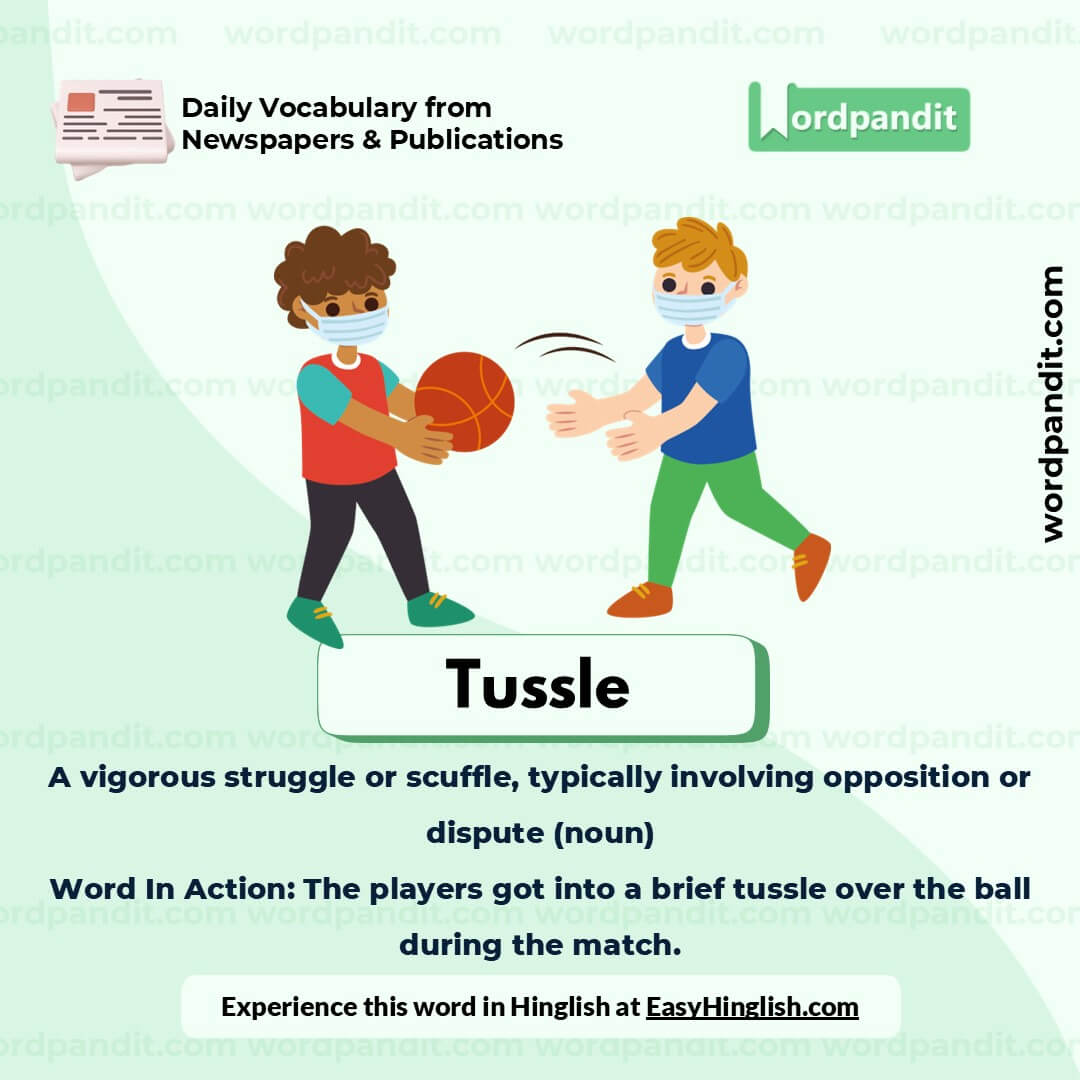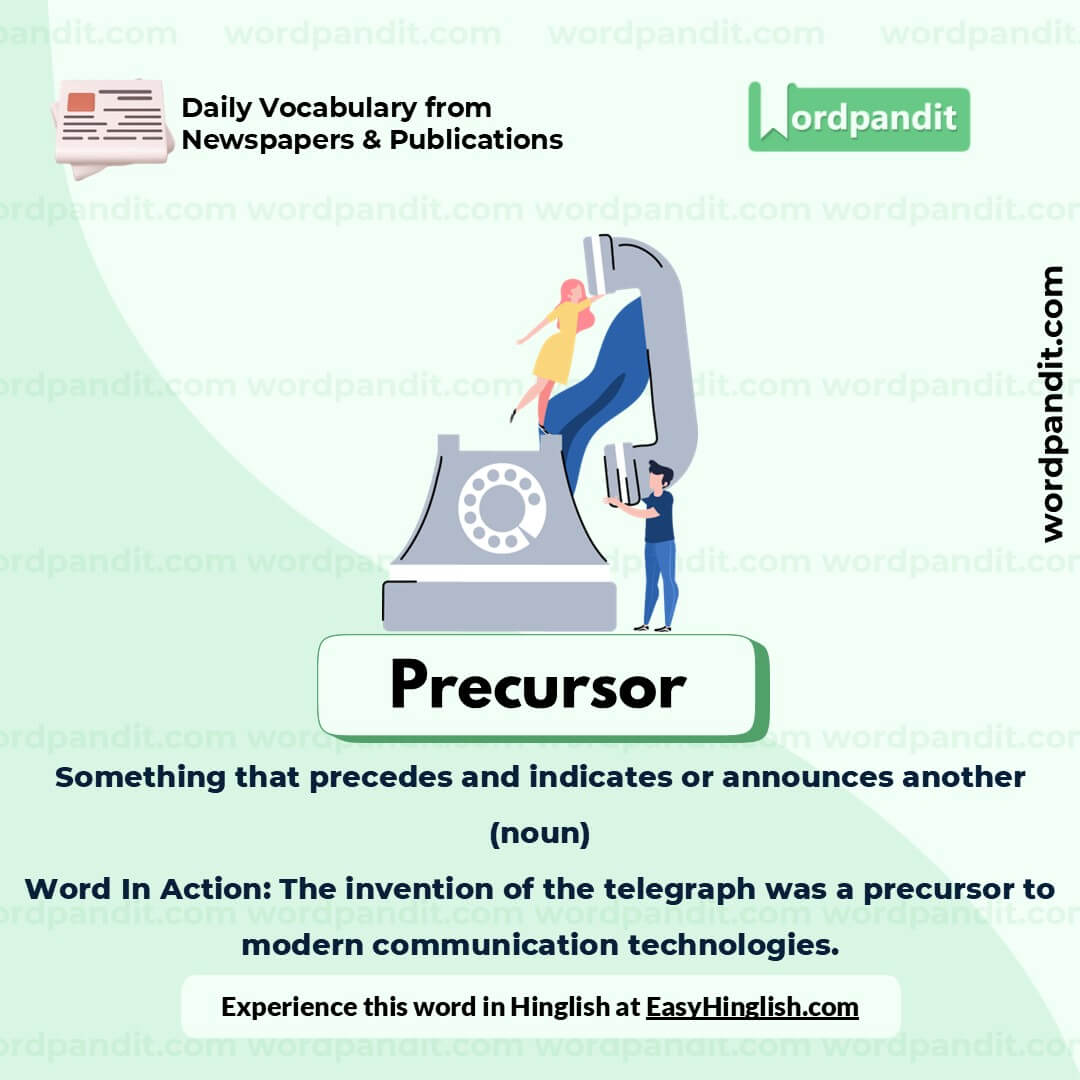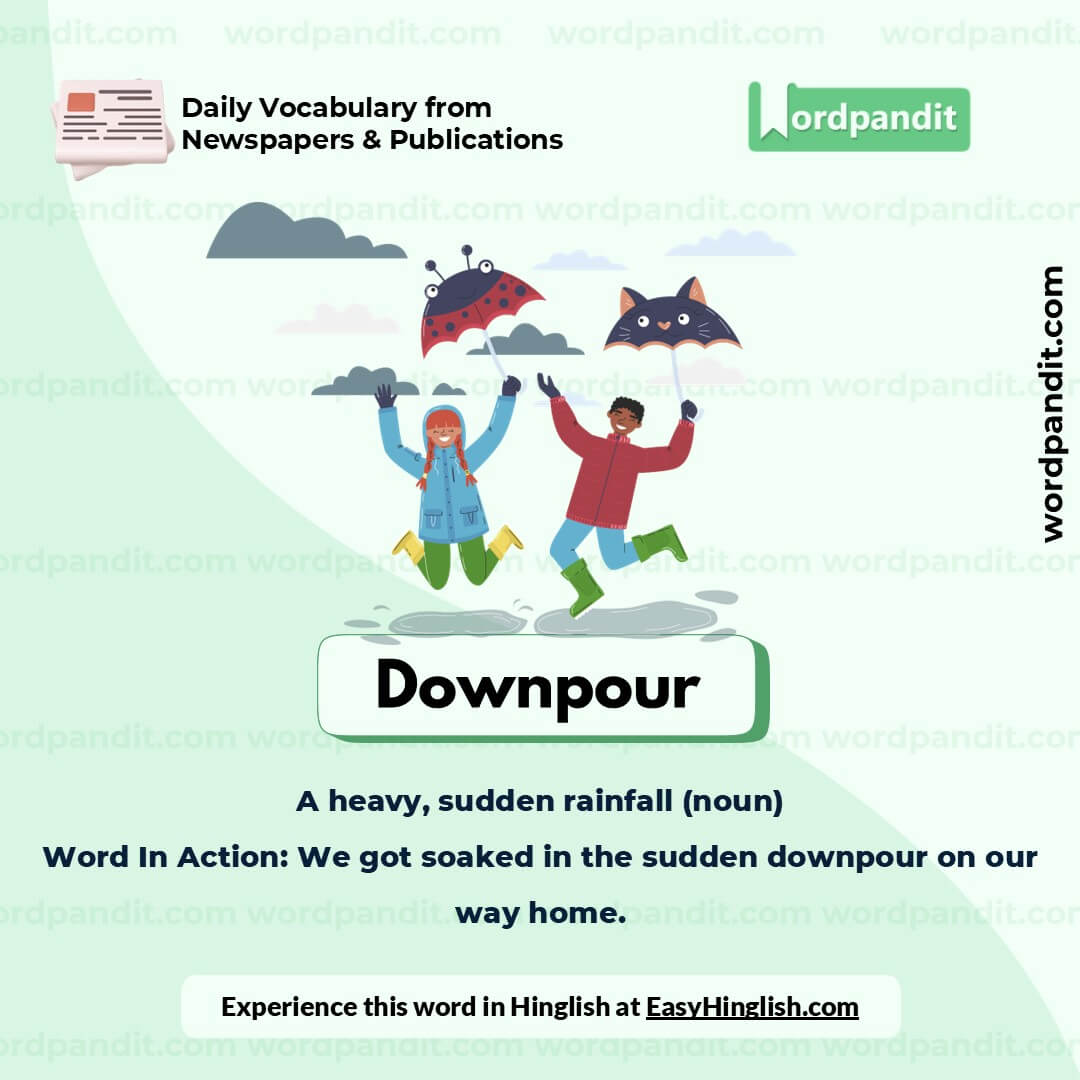Daily Vocabulary from Indian Newspapers and Publications
Welcome to Wordpandit’s Indian Vocabulary Hub
At Wordpandit, we understand the importance of staying rooted in the local context while expanding your language skills. This section focuses on enriching your vocabulary with words and phrases drawn from India’s leading newspapers and publications, ensuring you're learning vocabulary that is practical, relevant, and uniquely Indian.
Why Indian Sources Matter
We believe that the best way to master any language is by immersing yourself in local content. That’s why we carefully curate vocabulary from top Indian publications, including:
- The Hindu
- The Times of India
- The Economic Times
- Hindustan Times
- Live Mint
- The Indian Express
- And many others...
Stay Updated, Stay Relevant
With daily updates from Indian news sources, you’ll be consistently learning words that reflect the trends and shifts in Indian society and culture. Our focus is to provide vocabulary that enhances your understanding of the language in an Indian context.
How Wordpandit Supports Your Goals
Whether you’re preparing for exams, aiming to improve your professional communication, or simply want to stay connected with the latest Indian vocabulary, Wordpandit is here to guide you every step of the way.
Learn with a Practical Approach
Our interactive learning methodology includes real-world examples, engaging activities, and context-specific usage to ensure that every word becomes part of your active vocabulary.
Dive into Indian Vocabulary Today!
Why Choose Wordpandit?
Practical Learning: Focus on words you'll actually encounter in real-world reading, enhancing your comprehension and communication skills.
Diverse Content: From current affairs to scientific breakthroughs, our varied sources expose you to vocabulary across multiple domains.
Effortless Integration: Make Wordpandit a part of your daily routine. Just a few minutes each day can significantly boost your lexicon over time.
Your Path to Vocabulary Mastery
- Visit our Daily Vocabulary section regularly
- Explore new words and their usage in context
- Practice incorporating these words into your own writing and speech
- Track your progress as your vocabulary expands
Start Your Journey Today
Embark on your vocabulary enhancement journey with Wordpandit. By consistently engaging with our daily posts, you'll build a robust vocabulary that serves you well in academic, professional, and personal contexts.
Remember, a word a day keeps linguistic limitations at bay. Make Wordpandit your daily companion in the quest for vocabulary excellence!
WORD-1: Corollary
Context:
"The ILO considers the right to strike as a corollary of the right to organise." - The Hindu
Explanatory Paragraph:
A corollary is something that naturally follows or results from another thing. It suggests that one situation or event is a direct consequence of another. In the context given, the right to strike is seen as a logical outcome of the right to organize.
Meaning: A direct or natural consequence or result (noun)
Pronunciation: kuh-ROL-uh-ree
Difficulty Level: ⭐⭐⭐ (Intermediate)
Etymology: From Late Latin corollarium, meaning "deduction" or "proposition following directly from a proved proposition"
Synonyms & Antonyms:
Synonyms: consequence, result, effect, outcome, repercussion
Antonyms: cause, origin, antecedent
Usage Examples:
- The increase in traffic is a corollary of urban population growth.
- Freedom of speech is often seen as a corollary of democratic governance.
- The drought was a corollary of the extended heatwave.
- The rise in unemployment was a corollary of the economic downturn.
Cultural Reference:
"The ability to pay is a corollary of the freedom to borrow." - John Kenneth Galbraith
Think About It:
Can you think of any rights or freedoms that you believe have a necessary corollary? Why do you think they are linked?
Quick Activity:
Identify a corollary in your own life. Write about an action you took and the natural result that followed from it.
Memory Tip:
Think of "corollary" as "consequence-related" to help remember its meaning as something that follows as a result.
Real-World Application:
In debates or logical arguments, pointing out a corollary helps to show how one idea naturally leads to another, strengthening your reasoning.
WORD-2: Tussle
Context:
"A six-polar tussle on the election battlefield." - The Hindu
Explanatory Paragraph:
A tussle refers to a vigorous or intense struggle or conflict, typically involving physical force or strong opposition. It can also be used metaphorically to describe fierce competition or disputes, such as in the context of politics or elections.
Meaning: A vigorous struggle or scuffle, typically involving opposition or dispute (noun)
Pronunciation: TUHS-uhl
Difficulty Level: ⭐⭐ (Beginner)
Etymology: Originates from the early 17th century, perhaps related to Old English tussian, meaning "to pull or tear apart."
Synonyms & Antonyms:
Synonyms: struggle, fight, scuffle, battle, dispute
Antonyms: agreement, harmony, peace, truce, calm
Usage Examples:
- There was a brief tussle between the players over the ball.
- The politicians engaged in a heated tussle during the debate.
- The company faced a legal tussle over patent rights.
- The two friends had a friendly tussle over the last slice of pizza.
Cultural Reference:
"A tussle can be a reflection of greater societal conflicts, as seen in many revolutionary movements." - Historical Studies Journal
Think About It:
Why do you think political or social tussles tend to capture public attention more than peaceful resolutions?
Quick Activity:
Write about a minor tussle you've witnessed or experienced. What caused it, and how was it resolved?
Memory Tip:
Remember "tussle" by thinking of it as a "tough scuffle," reflecting its meaning of a vigorous struggle.
Real-World Application:
The word "tussle" can be used to describe not only physical struggles but also heated debates or intense competitions, making it versatile in discussions about politics, sports, or business.
WORD-3: Precursor
Context:
"This series, a precursor to the much tougher journey to Australia next month." - The Hindu
Explanatory Paragraph:
A precursor is something that comes before another thing, often serving as a sign or an introduction to what is to follow. In the context of the sentence, this series is described as a precursor to a more challenging event in the future, indicating it is preparing or leading up to the tougher journey to Australia.
Meaning: Something that precedes and indicates or announces another (noun)
Pronunciation: pree-KUR-sor
Difficulty Level: ⭐⭐⭐ (Intermediate)
Etymology: From Latin praecursor, meaning "forerunner," from prae (before) and currere (to run)
Synonyms & Antonyms:
Synonyms: forerunner, predecessor, harbinger, antecedent, pioneer
Antonyms: result, follower, successor, outcome
Usage Examples:
- The cold winds were a precursor to the storm that followed.
- The invention of the telegraph was a precursor to modern telecommunications.
- His resignation was seen as a precursor to broader changes within the company.
- The preseason matches were a precursor to the team's success in the main tournament.
Cultural Reference:
"In many mythologies, a precursor often appears to announce or herald the coming of a hero or a major event." - Mythology Studies
Think About It:
What are some events in your life that you can identify as precursors to major turning points or achievements?
Quick Activity:
Write about a precursor in history that led to a major event. What were the signs that something bigger was coming?
Memory Tip:
Think of "precursor" as "pre-cursor" (something that comes before), helping you remember its meaning as something that precedes or leads to another.
Real-World Application:
The word "precursor" is useful in discussions of science, history, and even personal events, helping to describe anything that serves as an early sign or indication of what will happen next.
WORD-4: Stalwarts
Context:
"It has been a while since these two stalwarts embossed their mark across a full series." - The Hindu
Explanatory Paragraph:
The term stalwarts refers to individuals who are particularly loyal, reliable, and strong supporters or participants, often considered pillars in their field. In this context, it is used to describe two prominent, influential figures in a series who have a history of making a significant impact.
Meaning: Loyal, reliable, and hardworking supporter or participant (noun)
Pronunciation: STAHL-warts
Difficulty Level: ⭐⭐⭐ (Intermediate)
Etymology: From Old English stælwierþe meaning "serviceable," derived from stál (place) and weorþe (worthy)
Synonyms & Antonyms:
Synonyms: champion, supporter, advocate, backbone, pillar
Antonyms: weakling, unreliable, disloyal, quitter
Usage Examples:
- The company relied heavily on its stalwarts during times of crisis.
- She has been a stalwart of the local community for decades.
- The stalwarts of the team ensured victory even in tough conditions.
- His reputation as a stalwart in the industry remains unmatched.
Cultural Reference:
"Political stalwarts often shape the direction of their parties for generations, as seen in the long-standing influence of figures like Mahatma Gandhi in India." - Political History Journal
Think About It:
Who are the stalwarts in your personal or professional life, and what qualities make them stand out?
Quick Activity:
Identify a stalwart in a field that interests you. Write about how their contributions have shaped the area they are involved in.
Memory Tip:
To remember "stalwart," think of a "stalwart" as someone "standing strong" like a pillar, who is unwavering and reliable.
Real-World Application:
The word "stalwart" is often used to describe people who are the most reliable or loyal members of a group, making it especially useful in discussions of leadership, politics, and teamwork.
WORD-5: Downpour
Context:
"Mr. Naidu directed the CMO to keep him updated about the downpour." - The Hindu
Explanatory Paragraph:
A downpour refers to a heavy and sudden fall of rain. It typically suggests an intense, short burst of rain that can cause flooding or other disruptions. In this context, Mr. Naidu is asking for updates about a significant rain event.
Meaning: A heavy, sudden rainfall (noun)
Pronunciation: DOWN-pohr
Difficulty Level: ⭐⭐ (Beginner)
Etymology: First recorded in the early 19th century, from the verb "down" meaning "to move downward" and "pour" meaning "to flow rapidly."
Synonyms & Antonyms:
Synonyms: deluge, cloudburst, torrent, shower, rainstorm
Antonyms: drizzle, sprinkle, dry spell
Usage Examples:
- The sudden downpour caught everyone by surprise, drenching the streets within minutes.
- We had to cancel the picnic due to an unexpected downpour.
- The downpour lasted for hours, causing rivers to overflow.
- Despite the downpour, the festival continued with enthusiastic participants.
Cultural Reference:
"Rain can be cleansing, but a downpour can symbolize overwhelming emotions or circumstances in literature and cinema." - Film Studies Quarterly
Think About It:
How do you think weather, particularly events like a downpour, influences human emotions and activities?
Quick Activity:
Write about an experience where a downpour interrupted your plans. How did you handle it?
Memory Tip:
Think of a "downpour" as rain that "pours down" heavily, helping you remember it as a sudden, intense rainfall.
Real-World Application:
The word "downpour" is useful in both casual and formal descriptions of weather conditions, especially when discussing sudden and heavy rainfall that can impact daily life or events.


















